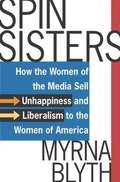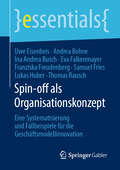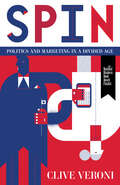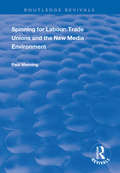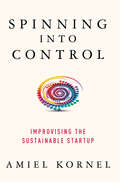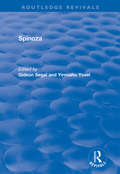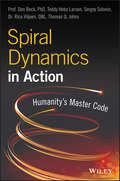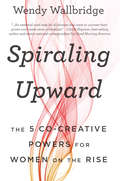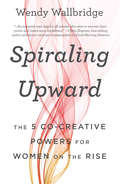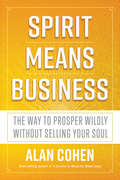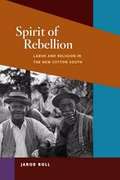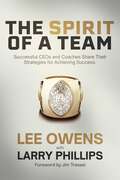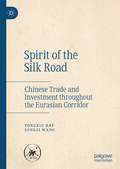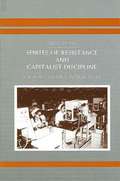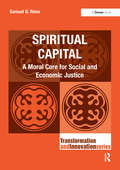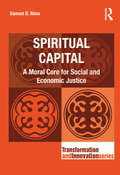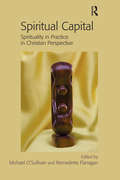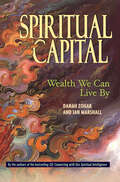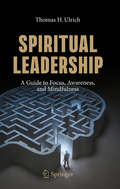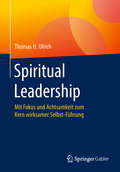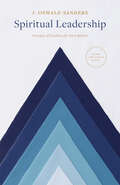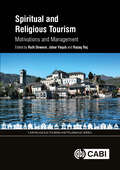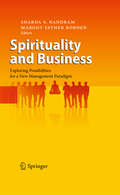- Table View
- List View
Spin Sisters: How the Women of the Media Sell Unhappiness and Liberalism to the Women of America
by Myrna BlythThe former editor of Lady's Home Journal and other woem's magazines takes a hard, thought-provoking look at how those magazines and the TV news magazines seek to promote a liberal political agenda while selling victimhood and unhappiness to American women. If you've ever wondered how the TV news magazines and women's magazines get those celebrity interviews, you need wonder no more. This book takes you to the dark side of the magazine business, and whether you're a woman who reads those magazines or just a media junky of either gender, you'll find this book fascinating.
Spin-off als Organisationskonzept: Eine Systematisierung und Fallbeispiele für die Geschäftsmodellinnovation (essentials)
by Uwe Eisenbeis Andrea Bohne Ina Andrea Busch Eva Falkenmayer Franziska Freudenberg Samuel Fries Lukas Huber Thomas RauschDie Autoren beschreiben mögliche Typen und Modelle von Spin-offs, einen idealtypischen Spin-off-Prozess mit Phasen und Meilensteinen, eine Zusammenstellung von Herausforderungen und Hindernissen sowie zwei Fallstudien, um den Spin-off-Prozess anhand konkreter Beispiele erlebbar zu machen. Die Handreichung gibt einen ersten Überblick über den Einsatz von Spin-offs als Organisations- sowie Strukturkonzept zur Geschäftsmodellinnovation sowie zur Gestaltung der Spin-off-Gründung. Das essential enthält neben den beiden Fallstudien zusammenfassende Checklisten am Ende der Kapitel.Die Autoren:Prof. Dr. Uwe Eisenbeis ist Wirtschaftswissenschaftler und hat die Professur für Medienmanagement und Ökonomie an Hochschule der Medien in Stuttgart inne. Seine Co-Autorinnen und -Autoren sind Absolventinnen und Absolventen des Studiengangs Medienwirtschaft an der Hochschule der Medien.
Spin: Politics and Marketing in a Divided Age
by Clive VeroniSpin has been updated with a new introduction reflecting on the current era of Brexit and Trump.Aided by masses of data, sophisticated computer modelling, and smart manipulation of social media, political strategists are reshaping the way voters think. And act. Clive Veroni analyzes the inner workings of campaign organizations to show how they build and motivate teams, and how they approach strategic and future planning. And those strategies being used to influence our choices at the ballot box will soon be used to influence our choices in the grocery store.Spin focuses on the well-known characters from the worlds of politics and marketing to reveal how all of us will be affected by the surprising new ways in which companies and politicians will try to persuade us to vote for their brands.
Spinning for Labour: Trade Unions And The New Media Environment (Routledge Revivals)
by Paul ManningFirst published in 1998, this volume asks: are groups or organisations beyond the sphere of Westminster politics doomed to be marginalised in mainstream news coverage, or can the currently fashionable emphasis upon media techniques and 'spin doctoring' offer such non-official news sources a means of securing media success?. This question is now surfacing as a major issue within politics and cultural debates, as well as within the sociology of the mass media and communication studies. We are living through a period of remarkable transformation in politics, culture and social arrangements. Communications experts in the 'new Labour' camp believe that trade unions must respond by becoming more sophisticated in their use of the media and marketing techniques; and by employing new vocabularies for communicating their messages to the public. However, can trade unions succeed in using the tricks of the 1990s spin doctor to restore their position?. This study uses extensive interviews with leading national newspaper journalists and senior figures within trade unions to explore the question. Drawing upon unique archive material the study points to the importance of government in fostering or undermining branches of journalism including coverage of labour relations.
Spinning into Control: Improvising the Sustainable Startup
by Amiel KornelThis book encourages startup founders to maintain control of their destiny by obsessively perfecting their startup's story and key relationships as much as its initial product or service. It highlights the importance of improvisation in the incubation of startups. Startup founders hoping to master their destinies develop the skills of venture craftsmen, learning to behave more like explorers and artisans than managers and engineers. The improvisational arts of tinkering, wandering, and conversing overcome the limitations of scientifically based "lean" methodologies for creating startups. These skills provide wobbly, nascent ventures with stability and conserve momentum during early-stage incubation. Like the gimbals of a gyroscope, they counter the entropy born of change, conflict and confusion that is continuously pushing young enterprises towards chaos. As their startups spin, venture craftsmen actually loosen the coupling between command and control. Startup sustainability relies on relentless improvisation, the heart of the art of entrepreneurship. Vignettes in each chapter of Spinning Into Control relate hardscrabble stories of entrepreneurs, craftsmen and venturers -- some recently interviewed by the author, others historical -- recounting the challenges they faced, their responses, the lessons they learned, and the eventually triumphant outcomes.
Spinoza: Spinoza On Reason And The Free Man (Routledge Revivals)
by Yirmiyahu Yovel Gideon SegalThis title was first published in 2002. This collection of essays aims to present a wide range of interpretations of central themes in Spinoza's philosophy. Philosophical interpretations of Spinoza divide into three general categories. The first sets Spinoza within what is taken to be his historical context. Special emphasis is laid here on aspects of his teaching that seem to bear the influence of Spinoza's own education (and self-education), either through concepts assimilated into his own thinking, or those he undertook to refute and displace. A second interpretative approach uses analytical tools in an attempt to reconstruct Spinozistic issues and theories critically. Finally, there are philosophers who explore Spinoza's texts in their own terms, attempting to present a coherent picture of one or more aspects of Spinoza's teaching. Given the broad span of issues with which Spinoza deals, the latter is often the most difficult track to follow. The 25 articles in this collection exemplify these three attitudes to Spinoza interpretation, though most avail themselves of more than one. In making the selection the editors preferred studies that treat their subject as a viable, endurable philosophical issue, whether the writer accepts Spinoza's presentation or highlights his difficulties. On each issue the articles critically analyze the texts, rather than simply portraying the Spinozistic ideas they express.
Spiral Dynamics in Action: Humanity's Master Code
by Prof. Don Edward Beck Teddy Hebo Larsen Sergey Solonin Dr Rica Viljoen Thomas Q. JohnsA more effective leadership model for the new business environment. Spiral Dynamics in Action explores the evolution of modern business, and provides a model for moving forward amidst ever-increasing complexity and change. Only by truly understanding other people's perspectives can you bring them together to achieve the extraordinary, and this book provides a field guide to the different motivations, behaviours and talents in your team to help you lead diverse groups more effectively. Focused on action over theory, the Spiral Dynamics model includes cutting-edge leadership practices, management systems, processes, procedures and techniques to help you bring about real-world results. The nature of change is consistent, but that doesn't make it any less enormous or complex to deal with. As a business leader, you are tasked with not only navigating change yourself, but also guiding others through the maze successfully. This book shows you how to shift your perspective, hone your focus and deliver what your people need by: Understanding the reasoning behind different perspectives. Helping people play off one another's strengths to achieve a shared goal. Adopting cutting-edge practices, processes and procedures for improvement. Taking action to re-connect an increasingly fragmented environment. The marketplace has gone truly global, workforces are increasingly diverse and companies are taking on powerful new social responsibilities. It's a lot to take in, let alone manage, but the responsibility of leadership is to gather disparate parts and make them into a whole. It's your job to turn anchors into rocket fuel, and motivate and inspire your team to the top. By digging to the core of each person, each culture and each problem, you uncover a roadmap to high performance; Spiral Dynamics in Action shows you how to guide your people through any changes and emerge stronger than before.
Spiraling Upward: The 5 Co-Creative Powers for Women on the Rise
by Wendy WallbridgeWomen comprise 51 percent of the world's population, make up over half of the workforce, and control 85 percent of consumer decisions. It's estimated that two-thirds of the nation's wealth will be in women's hands by 2030. Never before have women been so degreed or so represented as decision-makers in all areas of influence. Why, then, are women withdrawing from leadership positions in unprecedented numbers? Why has the tally of women in middle management reached a plateau?The traditional path to leadership in Western culture was forged by men. This linear, head-down, forward-at-all-costs method doesn't work for women, who define success in more holistic terms, seeking both personal and professional fulfillment. Wendy Wallbridge recognizes this unmet need of professional women for an alternative path to success, and her new book, Spiraling Upward: The 5 Co-Creative Powers for Women on the Rise, offers the solution. Using her tried and true "Spiral Up" method, Wallbridge teaches women to cultivate the five co-creative powers of energy, thoughts, feelings, speech, and action. This method encourages each reader to create a fulfilling life aligned with her own gifts and callings. Complete with easy-to-follow steps and exercises, as well as inspiring stories of thirty successful women, this book offers a cogent, step-by-step roadmap for professional women to unlock their power and achieve success on their own terms.
Spiraling Upward: The 5 Co-Creative Powers for Women on the Rise
by Wendy WallbridgeDual Winner -- 2016 Nautilus Gold Award (Women) and Silver Award (Business & Leadership). Women comprise 51 percent of the world's population, make up over half the workforce, and control 85 percent of consumer decisions. Never before have women been so degreed or so represented as decision makers in all areas of influence. Why, then, do we still feel as if success eludes us? Why do we sometimes struggle to keep our drive alive? The linear, heads-down, forward-at-all-cost approach to success that has been forged by men will never take us to the heart of fulfillment. Women are not designed for the straight and narrow path. But until now there hasn't been another choice. Pioneering corporate coach Wendy Wallbridge recognizes this unmet need of professional women for an alternative path to success. Spiraling Upward: The 5 Co-Creative Powers for Women on the Rise offers a cogent, step-by-step roadmap for professional women to unlock their power and achieve success on their own terms. The "Spiral Up" method teaches women to cultivate the five co-creative powers of energy, thoughts, feelings, speech, and action--the fundamentals of self-creation--in order to redefine success and re-author their lives. If you're ready to rise up and express your creativity, authenticity, voice, and power to effect the changes you want, Spiraling Upward will show you the way. Complete with easy-to-follow steps and exercises, as well as inspiring stories of successful women, this book offers a cogent road map for professional women looking to unlock their power and achieve success on their own terms.
Spire, the CubeSat Revolution, and the Government as a Space Data Customer
by Matthew C. Weinzierl Mehak Sarang Brendan RosseauThis case outlines the rise of Spire Global, a young space company using CubeSats to provide weather data and weather prediction services. In addition to tracing the evolution of a space startup from novel idea to publicly-traded company, the case also examines the broader questions posed by the success of Spire and similar space companies: what are the potential costs and benefits to the privatization of remote sensing satellites? What new possibilities are enabled for both governments and private entities by private remote sensing companies? How does the incipience of companies like Spire challenge the established weather data regime? What's the significance of highly-popular special purpose acquisition companies?
Spirit Means Business: The Way to Prosper Wildly without Selling Your Soul
by Alan CohenBeloved author and teacher Alan Cohen (A Course in Miracles Made Easy) uses his idiosyncratic, insightful spin on spiritual wisdom to show that we can enjoy significant career and financial success and be true to our passion and soul's calling.Can you create material success and keep your spirit alive? Is it possible to combine prosperity with purpose and passion? Can you sell your product without losing your soul?Expert coach and beloved teacher Alan Cohen demonstrates the answer is yes. In Spirit Means Business, he identifies--and then dismantles--the 10 primary illusions that keep us from connecting spirituality and prosperity. To name a few: * If you want to succeed, you have to suffer first * There's only so much to go around * Competition is healthy and necessary * To do well in your work, you must give up your lifeIn each case, Alan shows us how to replace the illusion with a higher truth, using principles that always work when we apply them consciously. You'll learn from down-to-earth examples of individuals who have combined soul and success, and you'll find crisp, clear formulas to bridge the gaps and surmount the hurdles along the way.Drawing on wisdom sources from the Tao Te Ching to A Course in Miracles, as well as stories from Alan's clients and his own life, this book will help you navigate a spiritually sound path to the success you desire.
Spirit of Rebellion: Labor and Religion in the New Cotton South (The Working Class in American History)
by Jarod RollWinner of the Herbert G. Gutman Prize from the Labor and Working-Class History Association In Spirit of Rebellion, Jarod Roll documents an alternative tradition of American protest by linking working-class political movements to grassroots religious revivals. He reveals how ordinary rural citizens in the south used available resources and their shared faith to defend their agrarian livelihoods amid the political and economic upheaval of the first half of the twentieth century. On the frontier of the New Cotton South in Missouri's Bootheel, the relationships between black and white farmers were complicated by racial tensions and bitter competition. Despite these divisions, workers found common ground as dissidents fighting for economic security, decent housing, and basic health, ultimately drawing on the democratic potential of evangelical religion to wage working-class revolts against commodity agriculture and the political forces that buoyed it. Roll convincingly shows how the moral clarity and spiritual vigor these working people found in the burgeoning Pentecostal revivals gave them the courage and fortitude to develop an expansive agenda of workers' rights by tapping into the powers of existing organizations such as the Socialist Party, the Universal Negro Improvement Association, the NAACP, and the interracial Southern Tenant Farmers' Union.
Spirit of a Team: Successful CEOs and Coaches Share Their Strategies for Achieving Excellence
by Larry Phillips Lee OwensExperience the leadership and life paths of the top football coaches from high school to college to the NFL mixed with CEOs who have succeeded in business on the field, as Coach Lee Owens interviews all of them to give readers a look at the path to excellence.Coach Lee Owens (Ashland University, Ohio State University, and Massillon High School), has been writing this book for the past forty-five years. During his coaching career, he had the opportunity to take over six struggling high school and college football teams. Each time the challenge was different, but the message was the same. He told each team they would be champions, and each time it happened. The blueprint for achieving team excellence works in the locker room, but it can also work in the boardroom. Motivating a team of football players is no different from motivating a team of salespeople or motivating your team at home. The Spirit of a Team gives readers real-life examples of how actual CEOs, coaches, and players used these skills to achieve success in the biggest arenas of business and sport. Lee Owens and Larry Phillips sat down with multiple individuals who exemplify leadership. Read the stories of Matt LaFleur, Luke Fickell, Dwight Schar, Sue Ramsey, Steve Clinkscale, Nate Moore, Matt Kaulig, Carl Johnson, Dan Niss, Bob Sebo, and more. Their stories are not only inspiring, but also a validation of the building blocks to team excellence that The Spirit of a Team outlines, mixed with Coach Lee Owens&’s twenty-six years of coaching experience and Larry Phillips&’s thirty-five years of journalistic insights.
Spirit of the Silk Road: Chinese Trade and Investment throughout the Eurasian Corridor
by Yongxiu Bai Songji WangThis book is a systematic analysis of the trade interconnectivity, logistics, urbanization, and economic development among countries along the Silk Road. The prospects for cooperation amongst countries on the Silk Road are clarified in a book which will interest scholars of geopolitics, of economic growth, and of China’s Belt and Road Initiative.
Spirits of Resistance and Capitalist Discipline: Factory Women in Malaysia
by Aihwa OngAn analysis of the rural conditions and economic status of female workers in the electronic industry in Malaysia.
Spiritual Capital: A Moral Core for Social and Economic Justice (Transformation And Innovation Ser.)
by Samuel D. RimaPresenting a thorough, comprehensive theory of spiritual capital based on solid academic research, 'Spiritual Capital' serves to reinforce and amplify the notion of a moral economic core that is beginning to feature in contemporary economic arguments. In this rare major work wholly dedicated to the subject of spiritual capital, Sam Rima explains the desperate need for revolutionary and transformational thinking in the area of economic policy and practice and makes the case for a new moral foundation to business and economics that directly addresses today's financial and business crisis. Writing in an accessible style, and drawing on examples from several continents, Rima explains spiritual capital theory in terms of the resources needed for its creation, how it is formed, how it can be invested and what the return on investment can be. The book provides practical tools for measuring a personal or organizational store of spiritual capital, along with clear guidelines on how to engage in spiritual capital formation. These will benefit business leaders interested in developing viable and sustainable enterprises capable of avoiding the disconnection between economic policy and social reality. There are also recommendations here for policy makers regarding the macro application of spiritual capital theory. This important contribution to Gower's Transformation and Innovation Series will appeal to business leaders and policy makers, academicians and students in the fields of sociology, theology, and economics, and anyone interested in social and economic justice issues, social innovation, and corporate social responsibility.
Spiritual Capital: A Moral Core for Social and Economic Justice (Transformation and Innovation)
by Samuel D. RimaPresenting a thorough, comprehensive theory of spiritual capital based on solid academic research, 'Spiritual Capital' serves to reinforce and amplify the notion of a moral economic core that is beginning to feature in contemporary economic arguments. In this rare major work wholly dedicated to the subject of spiritual capital, Sam Rima explains the desperate need for revolutionary and transformational thinking in the area of economic policy and practice and makes the case for a new moral foundation to business and economics that directly addresses today's financial and business crisis. Writing in an accessible style, and drawing on examples from several continents, Rima explains spiritual capital theory in terms of the resources needed for its creation, how it is formed, how it can be invested and what the return on investment can be. The book provides practical tools for measuring a personal or organizational store of spiritual capital, along with clear guidelines on how to engage in spiritual capital formation. These will benefit business leaders interested in developing viable and sustainable enterprises capable of avoiding the disconnection between economic policy and social reality. There are also recommendations here for policy makers regarding the macro application of spiritual capital theory. This important contribution to Gower's Transformation and Innovation Series will appeal to business leaders and policy makers, academicians and students in the fields of sociology, theology, and economics, and anyone interested in social and economic justice issues, social innovation, and corporate social responsibility.
Spiritual Capital: Spirituality in Practice in Christian Perspective (Transformation and Innovation)
by Michael O'Sullivan Bernadette FlanaganSpiritual Capital seeks to re-focus discussion on core social values, on individuals' value systems and the internal dynamics that impel human beings to live by truth, goodness and love. This book defines, refines and disseminates the concept of spiritual capital. Contributions by practitioner-scholars in applied spirituality, who have practical experience of spiritual capital at work in diverse human situations, provide accounts of concrete expressions of spiritual capital and create an interdisciplinary discussion between spirituality practitioners, artists, ecologists, sociologists and others on the frontiers of change in contemporary culture.
Spiritual Capital: Wealth We Can Live by
by Danah Zohar Ian MarshallOur world is at a crossroads; we must choose between two alternatives. The first is capitalism as we know it today-an amoral culture of short-term self-interest, profit maximization, emphasis on shareholder value, isolationist thinking, and profligate disregard of long-term consequences. Based on narrow assumptions about human nature and motivation, this system is unsustainable, a monster set to consume itself. The second alternative is "spiritual capital"-a values-based business culture in which wealth is accumulated in order to generate a decent profit while acting to raise the common good. Rather than emphasizing shareholder value, spiritual capital emphasizes "stakeholder value," where stakeholders include the whole human race, present and future, and the planet itself. Spiritual capital nourishes and sustains the human spirit. The crucial question is how we can move from one alternative to the other-how we can move from present-day business capitalism to Spiritual Capital. Danah Zohar and Ian Marshall introduce the concept of spiritual intelligence (SQ), and describe how it can be used to shift individuals and our culture from a state of acting from lower motivations (fear, greed, anger, and self-assertion) to one of acting from higher motivations (exploration, cooperation, power-within, mastery, and higher service). Zohar and Marshall describe how this shift actually happens a given organizational culture. They look in depth at the issues that dominate corporate culture and how they are influenced by the processes of SQ transformation and discuss the leadership elite who must be the ones to bring about and embody this cultural shift. Finally, Zohar and Marshall argue that spiritual capital is still a valid and workable form of capitalism and detail what we, as individuals, can do to make it happen.
Spiritual Leadership: A Guide to Focus, Awareness, and Mindfulness
by Thomas H. UlrichSpiritual leadership focuses on what you can experience and how you can work on your 'self.' Taking a non-religious stance, this book introduces readers to a dynamic layer model of the self, with inner centricity at its core. Leaders will learn how to work at different levels of their personality in order to achieve this inner centricity – the inner-core balance, the foundation of effective leadership in the VUCA world, and the foundation of personal authenticity and natural authority. Spiritual leadership combines classic leadership theories and models of authentic leadership with philosophical concepts and consciousness and awareness techniques inspired by the contemplative mindfulness movement. Practical exercises and illustrative examples support the application of the concept in professional leadership and private everyday life.
Spiritual Leadership: Mit Fokus und Achtsamkeit zum Kern wirksamer Selbst-Führung
by Thomas H. UlrichSpiritual Leadership fokussiert auf das, was man über sein Selbst erfahren kann, und wie man an seinem Selbst arbeiten kann. Das Buch stellt ein dynamisches Schichtenmodell des Selbst vor, mit innerer Centricity als Kern. Führungskräfte erfahren, wie sie an den verschiedenen Ebenen ihrer Persönlichkeit arbeiten können, um Centricity zu erreichen – das am eigenen Wesenskern ausgerichtete innere Gleichgewicht, das Grundlage wirksamer Führung in der VUCA-Welt sowie Basis persönlicher Authentizität und natürlicher Autorität ist.Spiritual Leadership verbindet klassische Leadership-Theorien und Modelle der Authentic Leadership mit Konzepten der Philosophie und der von kontemplativen Bewusstseinstechniken inspirierten Achtsamkeits- und Mindfulness-Bewegung.Praktische Übungsaufgaben und anschauliche Anwendungsbeispiele unterstützen die Anwendung des Konzepts im beruflichen und privaten Alltag.
Spiritual Leadership: Principles of Excellence for Every Believer (Sanders Spiritual Growth Series)
by J. Oswald SandersOver 1 million copies soldWhat every church will always needThe need for talented, vigorous leaders in the church cannot be overemphasized. Such times demand active service of men and women who are guided by and devoted to Jesus Christ.With more than 1 million copies sold, Spiritual Leadership stands as a proven classic for developing such leadership. J. Oswald Sanders, a Christian leader for nearly seventy years and author of more than forty books, presents the key principles of leadership in both the temporal and spiritual realms. He illustrates his points with examples from Scripture and biographies of eminent men of God, such as Moses, Nehemiah, the apostle Paul, David Livingstone, Charles Spurgeon, and others. Featured topics include:The cost of leadership The responsibility of leadership Tests of leadership The qualities and criteria of leadership The art of reproducing leaders The one indispensable requirement of leadershipSanders holds that even natural leadership qualities are God-given, and their true effectiveness can only be reached when they are used to the glory of God. Let this classic be your guide for leadership, and watch how God works through you to do great things for His glory.
Spiritual Leadership: Principles of Excellence for Every Believer (Sanders Spiritual Growth Series)
by J. Oswald SandersOver 1 million copies soldWhat every church will always needThe need for talented, vigorous leaders in the church cannot be overemphasized. Such times demand active service of men and women who are guided by and devoted to Jesus Christ.With more than 1 million copies sold, Spiritual Leadership stands as a proven classic for developing such leadership. J. Oswald Sanders, a Christian leader for nearly seventy years and author of more than forty books, presents the key principles of leadership in both the temporal and spiritual realms. He illustrates his points with examples from Scripture and biographies of eminent men of God, such as Moses, Nehemiah, the apostle Paul, David Livingstone, Charles Spurgeon, and others. Featured topics include:The cost of leadership The responsibility of leadership Tests of leadership The qualities and criteria of leadership The art of reproducing leaders The one indispensable requirement of leadershipSanders holds that even natural leadership qualities are God-given, and their true effectiveness can only be reached when they are used to the glory of God. Let this classic be your guide for leadership, and watch how God works through you to do great things for His glory.
Spiritual and Religious Tourism: Motivations and Management (Cabi Religious Tourism And Pilgrimage Ser.)
by Jane Legget Jean Carlos Santos Dr Shin Yasuda Dane Munro Onur Akbulut Vincente De Silva Yakin Ekin Özlem Güzel Suzanne Histen Jaffer Idris Tadeja Jere Jakulin Professor Maximiliano Korstanje Anne Liden Luana Moreira Marques Jahanzeeb Qurashi Ilker Sahin Ayça Sariyildiz Richard Keith Wright Seda YetímogluThis book reviews tourist motivations for making religious or spiritual journeys, and the management aspects related to them. It explores sacred journeys across both traditional religions such as Christianity and Islam, and newer forms of pilgrimage, faith systems and quasi-religious activities such as sport, music and food. Demonstrating to the reader the intrinsic elements and events that play a crucial role within the destination management process, it provides a timely re-assessment of the increasing interconnections between religion and spirituality as a motivation for travel. The book: - Includes applications, models and illustrations of religious tourism and pilgrimage management for converting theory into good practice; - Addresses theories of motivation and why travel to religious destinations has increased; - Explores key learning points from a selection of international case study perspectives. Providing researchers and students of tourism, religious studies, anthropology and related subjects with an important review of the topic, this book aims to bridge the ever-widening gap between specialists within the religious, tourism, management and education sectors.
Spirituality and Business
by Margot Esther Borden Sharda S. NandramThe effects of globalization influence corporate life and entrepreneurial culture and the implications are felt, directly or indirectly, by every world citizen. This book examines our inevitable relationship with business and the drives behind the way we do business. In a nutshell: 'me and mine' or 'thee and thine'. The former ends up in a cul-de-sac of individual and collective emptiness, alienation and self-destruction. The latter involves a transformation in the way we do business and leads to such benefits as collaboration, mutual enrichment and our livelihood being an integral part of our quest for a meaningful and fulfilling life. Spirituality is presented in this book as a possibility for providing a non-denominational inspiration and framework - both in theory and practice - for bringing about an inner transformation resulting in a new paradigm for business and management.
